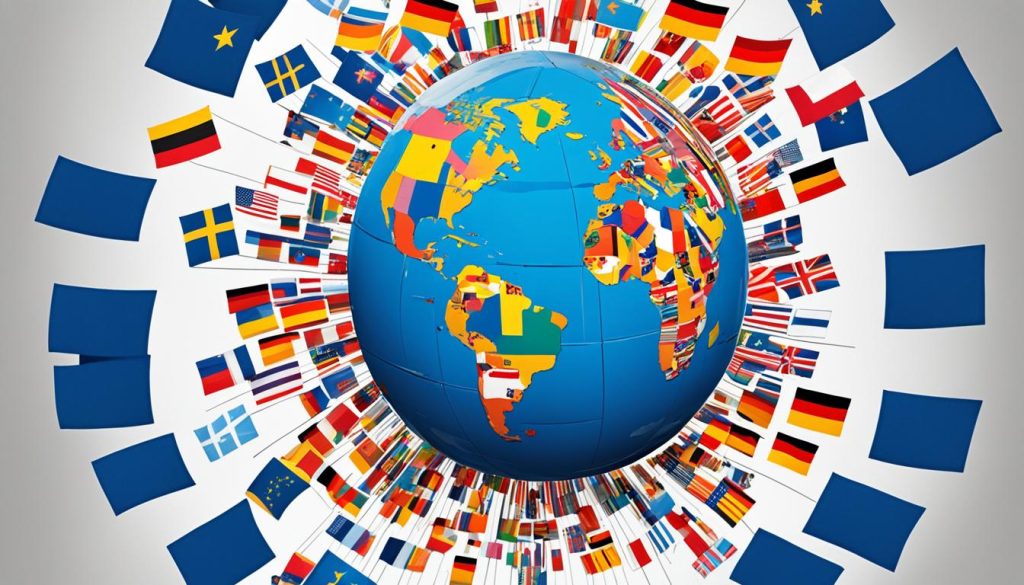Today’s world connects us more than ever before. This allows German businesses a great chance to grow globally. With their strong bases, powerful abilities, and creative ways of thinking, they are set for international success. By exploring global markets, making the most of technology, and thinking globally, they can build a strong global position.
Key Takeaways:
- German businesses have the potential to succeed globally due to their strengths, capabilities, and innovative mindset.
- Expanding reach and profitability in international markets is crucial for German businesses in today’s interconnected world.
- By tailoring strategies, building a global supply chain, and fostering cultural intelligence, German businesses can navigate global markets effectively.
- Leveraging technology, establishing strong international partnerships, and overcoming global competition are essential for global success.
- Compliance with regulations in global markets and cultivating a global mindset are key considerations for German businesses venturing abroad.
The Strengths of German Businesses
German businesses are well-known for their incredible strengths. This makes them leaders in the global market. These qualities have helped them succeed and be recognized worldwide. German businesses have a mix of characteristics that make them stand out.
1. Quality
Quality is a major strength of German businesses. They focus on making top-notch products and services. They’re known for precision and care, which leads to great craftsmanship and long-lasting goods. Quality is key in German manufacturing, ensuring customers are happy and loyal.
2. Innovation
German businesses lead with innovation. They constantly explore new technology and ideas. They spend a lot on research and embrace new ideas. Their innovative spirit keeps them ahead and pushes industries forward.
3. Engineering Excellence
Engineering is another area where German businesses excel. They are experts in complex systems and machinery. Their rigorous engineering and attention to detail produce efficient and reliable solutions. This expertise serves automotive, machinery, and technology sectors well.
4. Workforce Expertise
The workforce in German businesses is highly skilled. Their technical knowledge, paired with dedication and ongoing learning, delivers top results. Vocational training and apprenticeships ensure a pool of talented workers. This drives innovation and productivity.
5. Sustainability Initiatives
German businesses focus on sustainability too. They aim for eco-friendly practices, using resources wisely, reducing waste, and sustainable production. By doing so, they show their commitment to the environment and society.
These strengths help German businesses excel globally. Their dedication to quality, innovation, engineering, skilled workers, and eco-friendliness keeps them competitive. They continue to thrive in the ever-changing business world.
Global Market Opportunities for German Businesses
German businesses are making a mark globally, opening up many chances for growth. They can become global leaders by exploring new markets. This move strengthens their international status.
Emerging Markets
Emerging markets are a big opportunity for growth. These places are growing fast and have a high demand for goods. German companies can get ahead, get a good market position, and win loyal customers by entering these markets early.
Trade Agreements
Trade deals help German companies grow internationally by making it easier to enter new markets. Germany’s strong export business benefits greatly. These agreements let German businesses operate under better conditions, making them more competitive.
Cultural Factors
Culture impacts how business is done worldwide. German companies are known for being precise, high-quality, and innovative. They can meet various customer needs and fit into new cultures. Understanding and adapting to local cultures can help German businesses stand out.
Building networks with local partners is also key. Working with local companies can offer insights into the market and customer needs. These partnerships help German businesses understand the market better and succeed.
To sum up, the global market is full of opportunities for German businesses. By focusing on new markets, using trade agreements, and adapting to cultures, they can grow internationally.
Tailoring Strategies for International Success

For German businesses eyeing the global stage, the key lies in customising their approach for international success. A universal strategy simply won’t work in the varied landscape of today’s world. To flourish globally, adapting to each market’s distinct needs and tastes is essential.
Market Research: Understanding Global Dynamics
Stepping into new markets begins with detailed market research. It’s about understanding the unique cultural, economic, and political fabrics of each country. Analysing consumer habits, the competition, and market trends reveals opportunities. It allows companies to craft strategies that truly connect with local people.
Adapting Products and Services
Success abroad means tailoring products and services to international demands. Consideration of local laws, cultural inclinations, and what the consumer wants is crucial. This may mean tweaking product features, changing packaging, or inventing new offerings. Such adaptations help win hearts and spur growth.
Creating Effective Marketing Campaigns
Marketing plays a crucial role in making a mark on foreign soil. It’s about crafting messages and visuals that strike a chord with locals. Finding the right voice, conte nt that fits the language, and using images that resonate culturally are pivotal. Personalized marketing fosters trust and boosts brand loyalty, driving engagement.
Through thoughtful strategy tailoring, German firms can chase international success. Embracing the nuances of each market through research, product customization, and targeted marketing can set them apart as global leaders. This nuance approach ensures they’re not just participating but leading in the international marketplace.
Building a Global Supply Chain
For German businesses, creating a strong global supply chain is crucial. They need it to succeed in today’s connected world. By having an efficient supply chain across continents, German companies can make the most of global markets. This gives them an edge over competitors.
Having a global supply chain means German businesses can choose from more suppliers around the world. This access lets them find better-quality materials and rely less on just one supplier. By using various suppliers, they can avoid problems if the supply chain faces unexpected issues.
German companies also gain from working closely with international suppliers and distributors. Such partnerships make entering foreign markets easier and encourage sharing knowledge. These strategic relationships help understand local market trends and tailor products to meet global demands.
It’s vital to have good logistics in a global supply chain, too. Efficient transport and distribution networks mean products reach customers quickly, no matter where they are. Using new technologies helps make the supply chain smoother, increases visibility, and boosts efficiency.
Let’s explore the advantages of a strong global supply chain through a table. It compares German businesses with and without one. The differences are clear in market access, material sourcing, forming partnerships, and logistics.
| German Businesses with a Strong Global Supply Chain | German Businesses without a Strong Global Supply Chain | |
|---|---|---|
| Access to global market opportunities | High | Limited |
| Ability to source materials globally | High | Restricted |
| Establishing international partnerships | Easy | Challenging |
| Optimized logistics and distribution | Efficient | Inefficient |
The table above shows how important a global supply chain is for German businesses. It leads to better market access, sourcing, partnerships, and logistics. This means they can compete better and profit more.
In wrapping up, having a dynamic global supply chain is key for German companies to excel globally. It opens up markets, improves material sourcing, enriches partnerships, and fine-tunes logistics. Investing in a well-planned supply chain sets German businesses up for lasting growth and success on the world stage.
Cultural Intelligence and Global Communication
In today’s world, cultural intelligence and good global communication are key. They help German businesses succeed internationally. Knowing how to manage different cultures and languages is vital for making strong connections and exploring various markets.
To be culturally intelligent means understanding and adapting to various cultures. It’s about developing empathy, respect, and being aware of differences. German businesses can connect better worldwide by valuing cultural intelligence.
Good global communication is crucial for working together and building trust across countries. It’s about being clear, whether talking or using body language, to share ideas, make deals, and solve conflicts. Being able to communicate well makes it easier for German businesses to work internationally.
Managing teams from different cultures is also very important. When German companies grow globally, they work with diverse people. Managing these teams well means having a welcoming work place, encouraging open talks, and seeing cultural differences as benefits.
The Benefits of Cultural Intelligence and Global Communication
There are many advantages for German businesses that focus on cultural intelligence and global communication:
- Enhanced Customer Relationships: Understanding cultural differences helps tailor offers. This meets the unique needs of different customers.
- Effective Business Negotiations: These skills help in dealing with negotiation challenges. They build good relationships and positive agreements abroad.
- Innovative Problem-Solving: Valuing different views leads to better problem-solving. This results in more creative and adaptable solutions.
- Increased Productivity: Employees skilled in these areas work better together. This creates a good work environment and boosts productivity.
By focusing on cultural intelligence and communication, German businesses can be leaders in global markets. They gain a competitive edge in working across cultures.
Leveraging Technology for Global Reach

In today’s world, technology is key for German businesses going global. It’s vital for competitiveness and reaching customers everywhere. We will explore how German businesses can use technology to grow their global footprint and find new chances.
E-commerce: Unlocking a Borderless Market
E-commerce has changed how businesses reach customers, erasing borders. It lets German firms show and sell products globally online. By creating safe, easy-to-use online shops, they can enter new markets and grow their customer list hugely.
Digital Marketing: Reaching Target Audiences Worldwide
Digital marketing helps connect with customers all over the world. Through ads, social media, and SEO, German firms can target audiences anywhere. By learning what customers in different areas like, companies can tailor their marketing to grow their reach and sales.
Innovative Solutions: Enhancing Efficiency and Productivity
Technology has brought tools that make businesses more efficient. With automation, AI, and data analytics, German firms can improve how they work, increase productivity, and provide better products and services. These tech upgrades help stay ahead in the market and meet global needs.
Building Trust and Security
As German companies grow globally, trust and security are critical. Investing in strong cybersecurity and data protection builds customer trust worldwide. This is key for repeat business and long-term customer relationships.
Seizing Opportunities in the Digital Age
The digital age offers great chances for German businesses to thrive globally. By using technology, e-commerce, digital marketing, and new solutions, they can reach beyond borders. Technology opens many doors for growth and success.
Establishing Strong International Partnerships
Today, German companies have a big chance to grow globally. They can do this by creating strong ties with foreign partners. Working with firms from other countries opens up many opportunities and paths for growth.
By partnering internationally, German firms can tap into local knowledge, channels, and networks. This helps them enter and thrive in new markets more easily. Partnering with established businesses abroad helps overcome initial obstacles quickly.
These partnerships also help in understanding different cultures. Getting to know the customs and ways of doing business in other places enhances communication. It makes building relationships and working together more successful.
There are financial benefits too. German businesses can share risks and costs by pooling resources and expertise with their partners. This access to technology, talent, and innovation boosts their ability to compete globally.
An example of such success is the alliance between BMW and Toyota. They have developed hybrid electric vehicles together. This partnership has helped both companies make a bigger impact in the global market.
In summary, international partnerships are crucial for German companies aiming for global success. By working with partners around the world, they can navigate new markets better, embrace cultural diversity, and innovate. Such collaborations lay the groundwork for enduring growth and success on a global scale.
Overcoming Global Competition
In today’s world, German businesses face tough competition from around the globe. To grow and succeed, it’s key they stand out in this fierce battle. With smart strategies and a strong focus, German businesses can beat these challenges and lead internationally.
Strategies for Differentiation
German firms can shine by being different. Unique products or services help them grab attention in a crowded market. They must keep innovating and stay flexible to what customers want. This way, they’ll always be one step ahead of rivals.
Continuous Improvement
Staying competitive means always getting better. German companies should keep refining how they work and boost their efficiency. They should listen to feedback, watch market trends, and learn from the best. This helps spot improvement areas and stay ahead.
| Challenges | Strategies | |
|---|---|---|
| Intense competition from global players | Invest in research and development (R&D) to innovate and differentiate | |
| Price pressures and cost competitiveness | Streamline operations and optimize supply chain to reduce costs | |
| Changing consumer preferences and market dynamics | Continuously monitor trends and adapt products or services accordingly | |
| Localized competition in foreign markets | Develop cultural intelligence and establish local partnerships |
Global Collaboration and Partnerships
Partnering with others worldwide can open new doors for German companies. Strategic alliances let them enter new markets and share strengths. Such partnerships also tackle challenges like language and culture, making global business smoother.
Digital Transformation
Digitalization is changing the business world fast. By embracing digital tech, German firms can grow and reach more people. Using online sales, digital marketing, and data analysis helps understand customers better and work more efficiently.
Embracing these methods, German companies can navigate global competition. They are well-prepared to thrive internationally.
Compliance and Regulations in Global Markets

Working in international markets means you must understand compliance and rules. To do well globally, firms must follow specific laws and industry standards. Not following these can lead to big fines, harm to reputation, and even legal issues.
When moving into a new market, researching its rules and compliance needs is key. Every country has its own laws and standards, which can vary by industry. Getting help from legal experts or consultants who know the target market can be incredibly helpful. They make sure businesses handle compliance wisely.
Being open and clear is vital in global compliance. Companies need to communicate well and share information with regulatory bodies. This means giving them accurate reports, documents, and financial details on time. Being transparent helps build trust and shows the business wants to work in an ethical and responsible way.>
It’s also important for businesses to keep a good internal compliance system. This means making and following policies that support ethical actions and comply with international regulations. Doing regular checks and training staff can help keep everyone aware and follow the rules.
The Benefits of Compliance in Global Markets
Following compliance rules does more than just reduce risks; it also brings many benefits to businesses worldwide. Most importantly, it makes a company seem more reliable and trustworthy. This can draw in investors, partners, and customers. It also encourages fair play among competitors, creating a better business atmosphere.
Being compliant also lets businesses spot and deal with potential issues early on. By staying informed about new rules, firms can adjust their plans and operations. This helps avoid problems with supply chains and relationships with customers. Compliance also means businesses can better handle environmental, social, and governance (ESG) issues, leading to more sustainable and responsible operations.
Compliance in global markets is an ongoing effort. Being informed, flexible, and dedicated to ethical business is key to success in international markets. By sticking to compliance, companies become trusted global names and open doors to new growth and opportunities.
Cultivating a Global Mindset
In an increasingly interconnected world, it’s vital for German businesses to develop a global mindset for international success. This mindset is more than just spreading operations globally. It’s about embracing diversity, understanding different cultures, and welcoming new ideas.
Embracing diversity is key to an inclusive workplace. This approach values various cultures, languages, and traditions. By fostering respect and appreciation, German businesses can inspire innovation and enhance problem-solving.
Moreover, understanding different cultures is essential for effective communication with global partners and customers. Investing in cultural intelligence helps employees deal with cultural nuances. This way, they build stronger international relationships.
Cultivating New Perspectives
To develop a global mindset, German businesses should encourage curiosity about different perspectives. They can do this by urging employees to explore varied information sources and learn from global thought leaders. This leads to innovative solutions for worldwide challenges.
By challenging standard thinking and welcoming new ideas, German companies can remain competitive. Encouraging employee collaboration across departments and borders promotes continuous learning and growth.
The Benefits of a Global Mindset
A global mindset offers many benefits to German companies. It helps them handle the complexity of international markets, adjust to local needs, and devise winning strategies.
This mindset also opens up new markets, making it easier for German companies to enter emerging economies. Being able to adapt swiftly to market shifts and customer needs is a significant advantage.
Case Studies
Here are some examples of German businesses that have embraced a global mindset:
| Company | Industry | Global Success Story |
|---|---|---|
| BASF | Chemicals | Rapid expansion into emerging markets through strategic partnerships |
| Siemens | Technology | Innovation-driven growth and strong global presence |
| BMW | Automotive | Success in international markets due to product customization and localized marketing |
Case Studies of Successful German Businesses
In this section, we look at real-life examples of successful German businesses that made it big worldwide. These case studies show the strategies and ways these companies entered new markets and became international hits.
1. Automotive Industry: BMW
BMW stands as a prime example of German success. Founded in 1916, BMW now leads in producing luxury vehicles. It shines through innovation, skill, and top-notch quality, breaking into the global car market.
Its global reach comes from tailoring products for different markets. By pouring resources into research and pushing tech boundaries, BMW leads the industry.
2. Engineering and Technology: Siemens
Siemens is a key player globally, known for its engineering and technology prowess. Starting in 1847, it has grown into a giant, covering energy, healthcare, and transportation.
Its commitment to innovation and adjusting to market changes is behind its success. Siemens offers a wide range of products, serving many industries worldwide.
| Company | Industry | Market Reach |
|---|---|---|
| BMW | Automotive | Global |
| Siemens | Engineering and Technology | Global |
3. Consumer Goods: adidas
adidas, famous for sportswear and shoes, is a global success story. Starting in Germany, adidas is now known worldwide. Its focus on quality, new designs, and partnerships with sports stars has fueled its growth.
Understanding local cultures and customizing marketing strategies has been key for adidas. This way, it stands out and builds a strong global presence.
4. Pharmaceuticals: Bayer
Bayer is a leader in the pharmaceutical and life sciences field. It aims at research, innovation, and sustainability. Bayer offers various products, addressing health care needs globally.
Its strategy includes working with health professionals, academics, and other partners to innovate. With smart marketing and distribution, Bayer has made a strong mark worldwide.
| Company | Industry | Market Reach |
|---|---|---|
| adidas | Consumer Goods | Global |
| Bayer | Pharmaceuticals | Global |
These case studies showcase successful German companies with a global impact. By studying their strategies and successes, we gain insights for expanding internationally.
Conclusion
German businesses have shown they can succeed worldwide. They are leaders because of their innovation, quality, and efficiency. These strengths help them stand out in different industries.
By using specific strategies and building strong partnerships, they have excelled globally. Their efforts in understanding global cultures and communication have been key. This has helped them work well with partners around the world.
Technology has been essential for them to reach further and stay on top. They also make sure to follow international rules and standards. This ensures they operate fairly and meet global expectations.
German firms are always ready to adapt to new changes. This agility has kept them competitive and fueled their growth. In short, their hard work and smart approaches have led them to great success on the global stage.
With a focus on innovation and understanding of different cultures, they’ve achieved a lot. Looking ahead, German businesses are well-prepared for future challenges. They are set to remain leaders globally for many years.
















